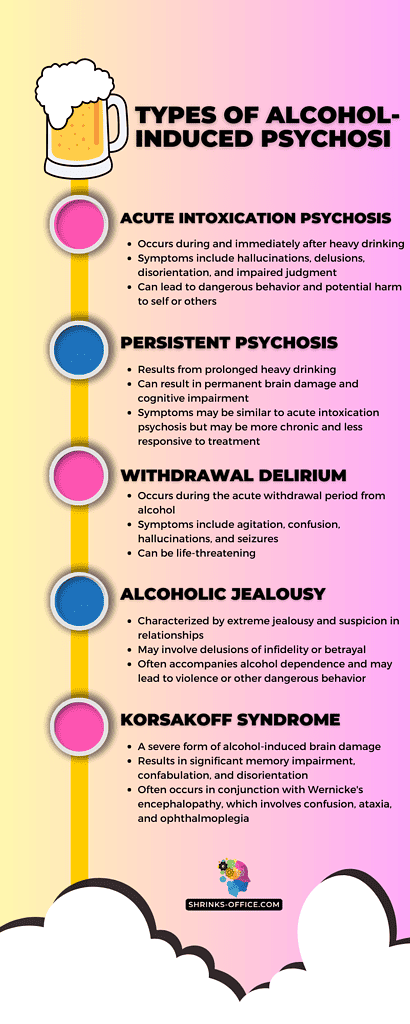In today's fast-paced world, finding moments of mindfulness can be a challenge. Embracing "The Power of Now"...

Understanding healthy vs unhealthy coping mechanisms is vital, especially considering how alcohol, an unhealthy choice, contributes to various mental health disorders. These disorders range from anxiety and depression to aggression and, in severe cases, psychosis.
Alcohol-induced psychosis is a significant disturbance in mental health often stemming from persistently high levels of consumption. This article will delve into the relationship between alcohol and psychosis, highlighting the signs of alcohol-induced psychosis and the available treatment options.

Alcohol-related psychosis is a serious mental health condition that can occur due to alcohol abuse, alcohol withdrawal, or dependence. It affects a small percentage of the general population, with a lifetime prevalence of 0.4%, but the risk is higher in individuals with alcohol dependence, where it affects 4% of the population[1].
If diagnosed with alcohol-related psychosis, the chances of being re-admitted are high at 68%, and there is a 37% chance of co-morbidity with other mental disorders[1]. The condition can have long-term consequences, with patients having a 5% to 30% risk of developing a chronic schizophrenia-like syndrome[1].
Heavy and prolonged alcohol consumption can cause acute intoxication and changes in the brain, leading to psychotic symptoms such as hallucinations, delusions, and disordered thinking, which can impair daily functioning. Alcohol can trigger psychotic disorders or worsen an existing psychotic disorder, and people with bipolar disorder [2] or schizophrenia[3] are particularly susceptible to alcohol-related psychosis.

There are two types of alcohol psychosis. But there are other psychosis conditions that are related to alcohol withdrawal, and some others related to nutritional deficiencies caused by heavy alcohol consumption. Nonetheless, most of them are related to alcohol poisoning[4].

Chronic alcohol use disorder, substance abuse, and/or excessive alcohol consumption significantly increase the risk of experiencing alcohol-induced psychosis [1]. The risk is even higher in working-age men who started drinking at a young age, have low socioeconomic status, are unemployed or living on their pension, or live alone[1]. Paternal Alcohol, mental illness, and genetic factors may also contribute to the development of alcohol-induced psychosis [1].
Studies have found that people with this condition are much more likely to be anxious, depressed, and even think about suicide. Furthermore, they may unexpectedly become violent or aggressive [1].

Alcohol-induced psychosis is a serious condition that requires prompt medical attention. Here are some effective ways to treat alcohol-induced psychosis[1]:
Here is a quick 10 question addiction test.
Alcohol can cause psychosis in both short and long-term alcohol abuse. However, the condition can be treated if the patient can abstain from Alcohol. Without proper treatment and the will of the patient, the chances of recurring psychotic episodes are exceedingly high[1]. It is, therefore, essential for patients to seek help from mental health professionals to manage the symptoms and underlying conditions associated with alcohol-induced psychosis. Patients can regain their mental well-being and lead productive lives with proper treatment.
Alcohol psychosis symptoms may vary depending on the individual and can range from mild to severe. Common signs and symptoms of alcohol-induced psychosis include hallucinations, delusions, disorganized thinking and speech, depression, confusion, aggression, and other behavioral changes.
Yes. Alcohol-induced psychosis is treatable, and with proper treatment, it can be reversed. However, the patient must abstain from alcohol consumption in order for the psychosis to be reversed and for recovery to begin.
In today's fast-paced world, finding moments of mindfulness can be a challenge. Embracing "The Power of Now"...
In our fast-paced world, finding moments of tranquility can be a challenge. Meditation apps offer a convenient...
In our fast-paced world, taking time for self-reflection and mindfulness is essential for well-being. Journaling can be...
In today’s fast-paced world, managing stress has become an essential aspect of maintaining overall well-being. Two popular...
Dissociation can be a challenging experience, especially the one that happens at work. Are you experiencing dissociation?...
Bionic reading transforms the reading experience for ADHD individuals by guiding the eyes for focus and understanding. Dive into the world of bionic reading.
Explore the complexities of postpartum depression and genetics in our blog 'Is Postpartum Depression Hereditary?' for insights into maternal mental health.
